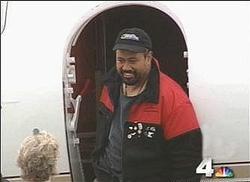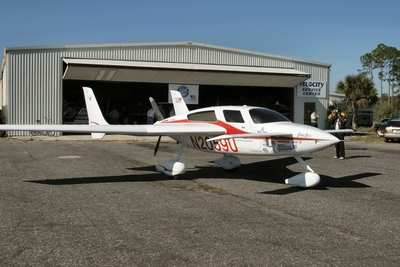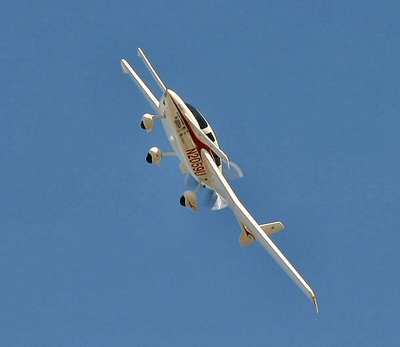Amateur Aviator Loses Engine On Way Home From Antarctica
 The good news is that 49-year old
Gus McLeod is okay. The bad news: He'll be shipping his
experimental aircraft home from Argentina in a box.
The good news is that 49-year old
Gus McLeod is okay. The bad news: He'll be shipping his
experimental aircraft home from Argentina in a box.
McLeod, of Laytonsville (MD), was trying a polar
circumnavigation of the world when he was forced to give up his
attempt after repeated attempts to cross the South Pole failed.
McLeod left College Park (MD) on December 29th, hoping to fly over
both poles -- a 28,000 mile trek. McLeod was attempting to become
the first pilot to fly across the top and bottom of the world.
The American pilot gave up his attempt last week after two
attempts to reach the South Pole. Both ended when he encountered
life-threatening icing conditions.
Spokesman Bruce Fries tells ANN McLeod took off from Buenos
Aires, Argentina, Saturday. But about 80 miles north of the
capital, his engine "suddenly sputtered and stopped at six thousand
feet," Fries said. McLeod tried to air-start the engine, but
couldn't.
"He had to glide in," Fries said in a Saturday night telephone
interview. "He found a pasture, but clipped some bushes and damaged
the landing gear." Fries said he got a call from McLeod on his
satellite phone at about 11:00 am EST Saturday, an hour after the
incident. Fries said McLeod told him he was uninjured in the forced
landing.
Compounding McLeod's problems was the fact that he doesn't speak
Spanish and no one at the crash site spoke English.

While Fries described the damage to McLeod's Firefly as minor,
he said the Maryland aviator will most likely have to ship the
Firefly, modified by Korean Aerospace, home in crates. Fries said
it was very unlikely that McLeod would try to repair the aircraft
there in Argentina.
"I imagine he'll be down there for a few days arranging to ship
the aircraft home," Fries said.
And so ends the year's fourth attempt at a South Pole crossing
-- none of which succeeded. As ANN reported in December, Australian
when Australian pilot Jon Johanson flew his RV-4 over the South
Pole on a flight from New Zealand to Argentina. But he didn't have
the fuel to make it all the way. Instead of landing in South
America, Johanson landed at the joint US-New Zealand base in
Antarctica, touching off an international incident between those
countries and his native land. Seems the folks at McMurdo-Scott
didn't want to give Johanson the fuel he needed to either finish
his flight or return to New Zealand.

But another adventurer whose South Pole Crossing was aborted
because of weather, came to Johanson's rescue. Briton Polly Vacher
had stocked fuel at the McMurdo-Scott base for her own flight. But
after giving up because of bad weather and (ironically) not enough
fuel, Vacher donated her avgas to Johanson.
 A week after the Johanson issue was
resolved, another polar expedition was halted by misfortune -- this
time, the crash of a Bell 407 in Antarctica.
A week after the Johanson issue was
resolved, another polar expedition was halted by misfortune -- this
time, the crash of a Bell 407 in Antarctica.
Jennifer Murray and Colin Bodill were hospitalized in the
Chilean city of Punta Arenas after their Bell 407 went down on the
northern section of the Ronne Ice Shelf in Antarctica.
Colin suffered a fracture to the lumbar 1 vertebrae, which
required an operation.
The crash came one-third of the way through Jennifer and
Colin’s attempt to break a world record by flying around the
world pole to pole in a helicopter. The Polar First Challenge team
still intends to submit a claim for the speed record for flying
from New York to the South Pole in a helicopter.
 ANN's Daily Aero-Linx (11.25.25)
ANN's Daily Aero-Linx (11.25.25) NTSB Final Report: Glasair GlaStar
NTSB Final Report: Glasair GlaStar ANN FAQ: Turn On Post Notifications
ANN FAQ: Turn On Post Notifications Classic Aero-TV: Red Tail Project Update Taking the Mission to the People
Classic Aero-TV: Red Tail Project Update Taking the Mission to the People Airborne 11.24.25: ANN's 30th!, Starships V3 Booster Boom, Earhart Records
Airborne 11.24.25: ANN's 30th!, Starships V3 Booster Boom, Earhart Records






